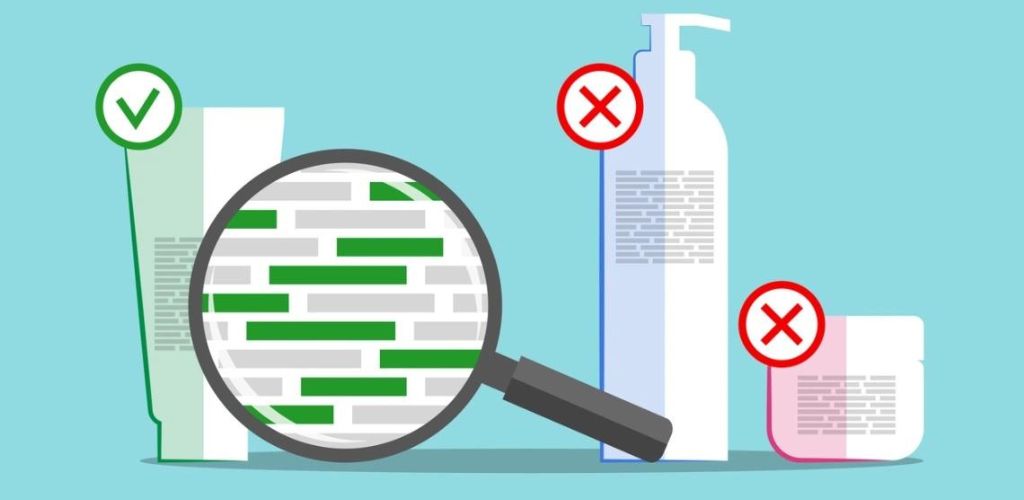Must Check These Harmful Ingredients Before Buying Skincare Products

When it comes to skincare, we usually buy products without doing much research but that’s not correct. You should be aware of the harmful ingredients in skincare products that you are going to apply to your face or hair and whether they are safe to use or not.
After doing detailed research about the chemicals and in how much amount they are included in the skincare and cosmetics products. We are here to summarize it for you.
Harmful Ingredients to Avoid in Skincare Products
Parabens:
In the 1950s, Parabens a family of chemical preservatives was first introduced. Parabens can be found in a wide variety of personal care products including moisturisers, shampoos, conditioner, body wash and foundations etc. They prevent the growth of mould and bacteria within these products, which allows their shelf life to be extended significantly.
However, there is always a debate, some researcher says that paraben are dangerous while some says they are not. But this is proved from some studies that the extensive amount of paraben may cause breast cancer.
Phthalates:
Phthalates are a class of chemicals that are added to plastics in order to make them more long lasting. They are used in some cases to help in the dissolution of other materials. Phalates are found in multiple products including lubricant oils, soap, body wash, shampoo and hair sprays etc.
Acording to the research, phthalates can be harmful for reproductive system. Infact they destroy the complete reproductive system of animals.
Formaldehyde:
Formaldehyde is a toxic and colorless flammabel gas. It is used for various purposes including food and medicine preservation, and can be mainly found in nail polishes, perfumes, lotions etc. If you inhaled this gas, it may cause irritation of the skin, difficulty breathing, watery eyes, and burning in the nose.
Workers who are doing job in such factories where there is a large amount of formaldehyde gas exist in the environment are advised to be very careful. As it may lead to cancer.
Alcohal:
Bad alcohols have the ability to harm the components that safeguard your skin’s health. They accomplish this by destroying the barrier that is provided by your skin.
Alcohols may have a pleasant sensation since they are light and prevent your face from feeling oily, But on the other hand, it can cause damage to the skin barrier, which in turn leads to a rise in acne-causing bacteria and exacerbates inflammation.
Sulphates:
Sulfate is a type of salt that is produced as a reaction of sulfuric acid with another chemical. Sulphate is a more general word for synthetic sulfate-based substances that you might be concerned about, like sodium lauryl sulphate (SLS) and sodium laureth sulphate (SLES).
Sulphates are mostly found in bath & body products like shampoo, cleaser, toothpaste, soap, face wash etc. When you use products that contain SLS and SLES, you run the greatest risk of causing irritation to your eyes, skin, mouth, and lungs. Moreover it also have the potential to clog pores and cause acne in peoples who have sensitive skin.
Lead:
Lead is a heavy metal which is found in eye liner, foundation, toothpastes, and lipstick. It is not added directly to the lipstick, but it is the main toxic material present in lipstick colorants. The extensive amount of lead may be harmful to your health. Due to which, the foods and drug association allows 0 to 20 parts per million (ppm) amounts of lead in cosmetic products.

Mineral Oil:
Examine the expensive bottle of beauty oil, cream or any other cosmetics product that you are going to purchase. Check out it’s ingredients list, and if the list includes mineral oil then must be very careful.
Mineral oil is often used as a filler in a variety of lotions, oils, and creams. Because of its ability to clog pores and coat the skin, it can cause acne and pimples.
PEG (Polyethylene Glycols):
Polyethylene glycols compounds, which are more commonly referred to as PEG, are frequently utilised in the cosmetics industry as thickeners and softeners.
If you use product that contains PEG on injured or broken skin it may cause systemic toxicity, redness and irritation. PEGs are also known to decrease the amount of moisture present in the skin, and increases skin aging.

